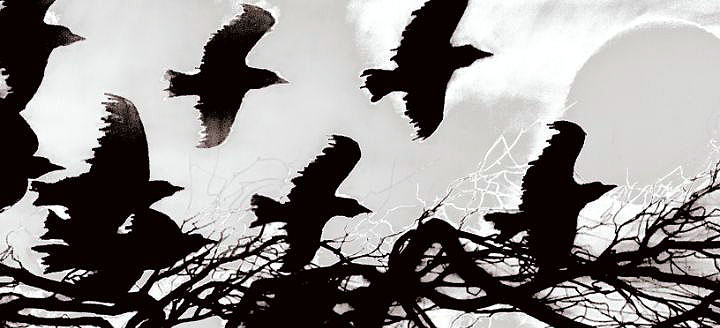
Thus I Laughed
When I visited humankind,
I found them sitting upon an old self-conceit.
Each one thought he had long since known
what was good and evil for humankind.
All talk of virtue seemed to them
an ancient wearied affair;
and he who wished to sleep well
spoke of ‘good’ and ‘evil’
before retiring.
I disturbed this somnolence
when I taught nobody yet knows
what is good and evil
–unless it be the creator!
But he it is who creates
a goal for humankind
and gives the earth its meaning
and its future:
he it is who creates the quality
of good and evil
in things.
And I bade them overturn
their old professional chairs,
and wherever that old self-conceit had sat.
I bade them laugh
at their great masters of virtue
and saints, and poets,
and world redeemers.
I bade them laugh
at their gloomy sages,
and whoever had sat
as a black scarecrow,
cautioning,
on the tree of life.
I sat myself
on their great grave-street,
and even beside carrion and vultures and —
I laughed
over all their ‘past’
and its decayed expiring glory.
Truly,
like Lenten preachers and fools
did I cry anger and shame
over all their great and small things
–their best is so
very small!
Their worst is so
very small! —thus
I laughed.
Thus
from out of me
cried and laughed my wise desire,
which was born on the mountains,
a wild wisdom, in truth!
–my desire with great rushing wings…
Thus Spake Zarathustra by Friedrich Nietzsche, trans. by R. G. Hollingdale, III Of Old and New Law-Tables aphorism 2
This passage has a sardonic appeal. No doubt this manner of speaking is an ‘acquired’ taste.
Does not each of us find comfortable repose among the bric-a-brac of the customary valuations which we’ve accumulated? A hierarchy of values is always on the menu of society. You get to pick what the house has to offer. Don’t even think of making your way into the kitchen. Place your order, consume what what is offered, smile… You are happy (entertained) are you not!?
Self-conceit. None other than assumption that good and evil is not a mystery, that everyone ‘knows’ what those words mean. The person speaking attempts to awaken us, to insist that such a matter is not settled. Indeed only a divine-like creator would be in a position to recognize a quality of good and evil in humankind and in that reciprocal relationship with the earth.
But we, wrapped in sartorial robes, the garb of delusion, academic gowns, judicial robes, and any other role that we imagine as redemptive (proficiency at piety, or the wordsmith-poet) would be well served to chuckle at ourselves — to laugh.
Laughter is the R× prescribed by the reclusive Zarathustra…
I payed attention to the image of a black scarecrow lingering close to the tree of life. The promise of abundance is shadowed by its opposite. And Zarathustra finds a curbside seat along our grave-street. Pay no attention to the vultures picking at carrion strewn around…
This is the season of Lent, a period dedicated to self control. The preacher, our spokesperson, the fool orchestrates our Lenten lamentation. The greatest of our works, — so small, so small.
Nietzsche giving literary voice to his Zarathustra ends with a laughter and grief combined to a wild wisdom. Something born in the spare, cold, astringent atmosphere of high mountains. Desire suggested by the beat of eagle’s wings!
Perhaps all of that is just too much to digest? Or it could be exactly enough. Perhaps such as this is called for on the day after our Supreme Court decreed that ex-President Trump may not be barred from the ballot. There is no disagreement that he did incite an overthrow of the government. There is no disagreement about the meaning of the Fourteenth Amendment.
How about a tune? Run To You by Bryan Adams!